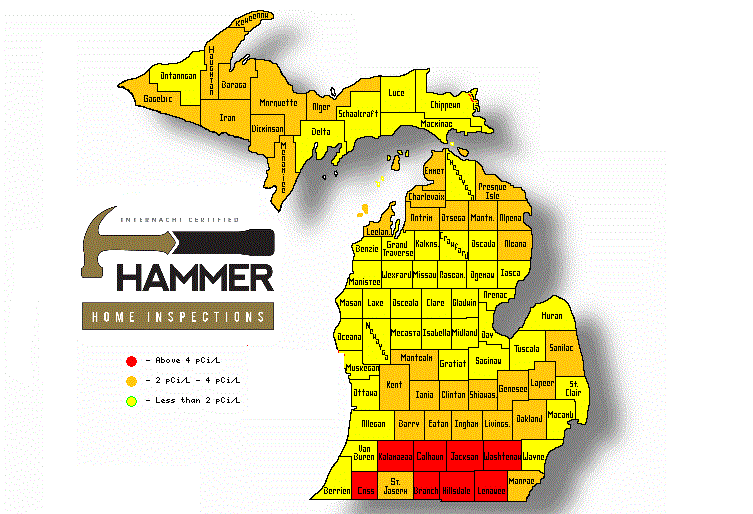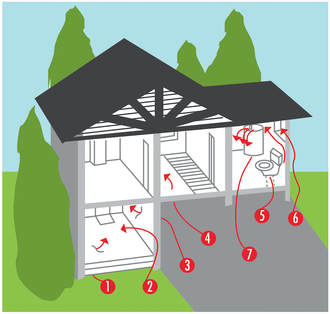- Home Page
- Schedule Online
- Pricing & Services
- Reviews
- More About Glenn
- Sample Report
- Sewer Scope Inspections
- Radon Testing
- Wood Destroying Insects
- Hidden Moisture
- Thermal Imaging Advantage
- Thermal Scan Inspections
- Pre-Offer Inspections
- 11th Month Warranty
- Free Home Warranty
- Inspection Agreement
- Videos
Gain Peace of mind by having your home tested for radon gas
1 IN 4 MICHIGAN HOMES HAVE A RADON LEVEL
THAT POSES A SIGNIFICANT HEALTH RISK.
Radon is the #2 Leading cause of Lung cancer
|
What is radon?
Radon is a colorless, odorless radioactive gas that is produced by decaying uranium in the earth's soil. It’s present in nearly all soils, and very low levels of radon are found in the air we breathe every day. Higher levels of radon can be found indoors. Closed home conditions tend to keep levels of radon gas from being diluted by fresh air. This is one reason exposure is higher in winter months. |
|
How does radon enter a home?
Radon gas is drawn into a home from the surrounding soil through any cracks, gaps, and penetrations in a home's foundation wall or floor. It also can seep directly through pores in concrete. Any home, of any age, in any state, can have elevated radon levels. It ultimately depends on the design and way your home interacts with the surrounding soil. Radon levels are usually highest in the basement or crawl space as this level is closest to the source of the radon. Therefore, people who spend much of their time in basement rooms have a greater risk of being exposed. |
Why is it a problem?
Long-term exposure to high levels of radon can cause lung cancer. Radon gas in the air breaks down into tiny radioactive elements that can become lodge in the lining of the lungs, where they can give off radiation. This radiation in return damages lung cells and eventually leads to lung cancer.
Long-term exposure to high levels of radon can cause lung cancer. Radon gas in the air breaks down into tiny radioactive elements that can become lodge in the lining of the lungs, where they can give off radiation. This radiation in return damages lung cells and eventually leads to lung cancer.
- The Environmental Protection Agency classified radon as a human carcinogen in 1988.
- Today radon is the #1 cause of lung cancer among non-smokers in the U.S.
- Radon is the second leading cause of lung cancer overall with cigarette smoking being the most common cause.
- Smokers who are exposed to radon will significantly increase their chance of developing lung cancer.
- Over 20,000 Americans die of radon-related lung cancer each year.
- Radon poses a greater health risk to children than to adults.
When Should you take action?
According to the EPA, the average indoor radon level is about 1.3 picocuries per liter (pCi/L). People should take action to lower indoor radon levels if your home tests 4.0 pCi/L or higher. The EPA estimates that nearly 1 out of every 15 homes in the United States have elevated radon levels. In Michigan, one in four homes have a radon level that poses a significant health risk. A long-term test will give you the most accurate reading, but a short-term test is acceptable if you need the results quickly, such as for a real estate transaction. If a radon test registers above 4 pCi/L, consider taking steps to reduce radon levels in your home.
EPA and the Surgeon General recommend that you test your home. Testing is the only way to know if you and your family are at risk from radon. You should not and cannot predict radon levels based on national, state, local, or neighborhood radon readings. Never rely on radon test results taken in other homes in your neighborhood to estimate the radon level in your home. No two homes are alike. Neighboring homes can have different indoor radon levels. Testing is the only way to find out what your home’s radon level is. Testing is recommended every two years because homes settle, new cracks form in the foundation and radon levels can change.
How Hammer Home Inspections tests for radon?
With the use of continuous radon monitors (CRM). CRM is a device that is placed usually, in the lowest level of the home. This device will continuously sample the air and record radon levels. The minimum amount of time needed to test for a real estate transaction is 48 hours. This is considered a short-term test. Long-term testing would be over 90 days. To help give you the most accurate and timely reading in your narrow inspection period, Hammer Home Inspections prefers to drop off the CRM a few days ahead of the scheduled home inspection date. This allows for radon results to be given the same day as the home inspection and provides the opportunity for a longer test period if the home inspection is scheduled in advance.
When testing for radon, closed home conditions are needed. What this means is that all doors and windows need to be closed 12 hours before the CRM is set in place and these conditions must be maintained throughout the test period. Normal use of doors and windows for entry is acceptable. Heating and cooling systems can be functioned as normal as well.
The state of Michigan does not require every home sale to be tested for radon. I wish they did. Not only would this allow for better records of areas with elevated levels. It would help minimize the exposure and save lives. Knowing if levels need to be reduced before a new buyer moves in is one thing. But what about the family that has lived there for 25+ years not knowing that when they bought the home, it had elevated levels? It's scary and sad to think now they are more at a risk to develop lung cancer all because they either weren't informed or wanted to save some money by not testing.
Adding a radon test to your home inspection is $150.00
Standalone RADON TESTing IS $175.00
(distance fee may apply)
Copyright © 2016-2024 Hammer Home Inspections, LLC
- Home Page
- Schedule Online
- Pricing & Services
- Reviews
- More About Glenn
- Sample Report
- Sewer Scope Inspections
- Radon Testing
- Wood Destroying Insects
- Hidden Moisture
- Thermal Imaging Advantage
- Thermal Scan Inspections
- Pre-Offer Inspections
- 11th Month Warranty
- Free Home Warranty
- Inspection Agreement
- Videos


